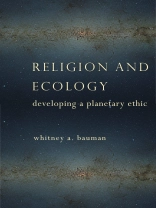Moving beyond identity politics while continuing to respect diverse entities and concerns, Whitney A. Bauman builds a planetary politics that better responds to the realities of a pluralistic world. Calling attention to the historical, political, and ecological influences shaping our understanding of nature, religion, humanity, and identity, Bauman collapses the boundaries separating male from female, biology from machine, human from more than human, and religion from science, encouraging readers to embrace hybridity and the inherent fluctuations of an open, evolving global community.
As he outlines his planetary ethic, Bauman concurrently develops an environmental ethic of movement that relies not on place but on the daily connections we make across the planet. He shows how both identity politics and environmental ethics fail to realize planetary politics and action, limited as they are by foundational modes of thought that create entire worlds out of their own logic. Introducing a postfoundational vision not rooted in the formal principles of 'nature’ or 'God’ and not based in the idea of human exceptionalism, Bauman draws on cutting-edge insights from queer, poststructural, and deconstructive theory and makes a major contribution to the study of religion, science, politics, and ecology.
Spis treści
Acknowledgments
Introduction: The Emergence of Planetary Identities
1. Religion and Science in Dialogue
2. Destabilizing Nature: Natura Naturans, Emergence, and Evolution’s Rainbow
3. Destabilizing Religion: The Death of God, a Viable Agnosticism, and the Embrace of Polydoxy
4. Destabilizing Identity: Beyond Identity Solipsism
5. The Emergence of Ecoreligious Identities
6. Developing Planetary Environmental Ethics: A Nomadic Polyamory of Place
7. Challenging Human Exceptionalism: Human Becoming, Technology, Earth Others, and Planetary Identities
Notes
Glossary
Works Cited
Index
O autorze
Whitney A. Bauman is assistant professor of religious studies and an Honors College Fellow at Florida International University. His books include
Theology, Creation, and Environmental Ethics;
Grounding Religion: A Field Guide to the Study of Religion and Ecology;
Inherited Land: The Changing Grounds of Religion and Ecology; and
Voices of Feminist Liberation: Writings in Celebration of Rosemary Radford Ruether.












